Brazil - MINISTER OF THE TSE FOLLOWED AN APPLICATION FOR THE TECHNICAL AREA OF THE TRIBUNAL
"Manipulating user behavior by controlling data on the Internet".
Barroso orders internet giants to respond to pro-Bolsonaro shootings
MINISTER OF THE TSE FOLLOWED AN APPLICATION FOR THE TECHNICAL AREA OF THE TRIBUNAL
BRASÍLIA
The minister Luis Roberto Barroso, rapporteur at the Superior Electoral Court of the provision of partial accounts of President - elect Jair Bolsonaro (PSL) ,
has determined that WhatsApp, Facebook, Twitter, Instagram and Google will respond within a period of three days if there has been a hiring of content promotion in favor of the candidate during the elections.
Barroso responded to a request from the technical area of the TSE, which analyzes the campaign accounts presented by Bolsonaro. The notifications were issued this Friday (9).
"The 2018 elections are the first case in which the hiring of content on the Internet has been authorized .... The pushing of content is considered election spending, subject to registration and to the limits set by law," Barroso wrote in his decision.
[x]
"I hereby determine the dispatch of circularization [technical term for requesting documents and information to prove the veracity of the accounts] for companies Google, Facebook, Twitter, Instagram and WhatsApp with the objective of identifying the contracting of content in the global computer network in favor of the candidate elected to the Presidency of the Republic, Mr. Jair Messias Bolsonaro, with the individual details of each of the operations, "the minister wrote.
He determined that internet giants should describe the name, CPF / CNPJ number of the prospective contractor, the date of hiring, the type and value of the service purchased.
On October 18, Folha revealed that entrepreneurs spurred shots by WhatsApp against the PT. The practice is illegal, because it is a campaign donation by companies, prohibited by electoral law, and not declared. Bolsonaro and his allies deny that they have contracted this type of service.
After the publication of the report, the PT candidate's lawyer, Fernando Haddad, asked the TSE to open an Aije (Electoral Judicial Investigation Action) to investigate alleged abuse of economic power and misuse of media by the Bolsonaro campaign.
The action was opened by the general judge of the Electoral Justice, minister Jorge Mussi. The defense of Bolsonaro said that the action does not deserve to continue because it is based solely on journalistic and lack robust evidence of irregularities.
This type of action in the TSE (Aije), provided for in supplementary law 64/1990, serves to investigate misuse, misuse or abuse of power or improper use of the media.
If it is judged appropriate, it may, in the course of the lawsuit, cause the inmate's ineligibility. If there is only a decision after the election and diploma, it may cause the cancellation of the mandate of the plate - in the case of Bolsonaro and his deputy, General Hamilton Mourão (PRTB).
Bolsonaro joined the TSE with a request for a right of reply in Folha , which was denied by Minister Sérgio Banhos . He considered it unfounded. "The mere fact that the subject matter is investigative does not denigrate its journalistic character. In terms of freedom of the press, it should not, as a rule, suppress the right to information of voters, "said Banhos." In these free press years, many media investigations have had the country, "the minister said in his decision.
In addition to this action, on October 27, lawyers for the Bolsonaro candidacy entered the TSE against the PT candidate, Fernando Haddad, his deputy, Manuela D'Avila (PC do B), the president of the Folha Group, Luiz Frias, Maria Cristina Frias, editor and editorial editor of Folha, and reporter for the newspaper Patrícia Campos Mello, author of the report published on the 18th.
The lawsuit sought injunction for the presentation of formal documents related to the text. The request was denied by the electoral corregidor, minister Jorge Mussi, who requested the manifestation of those involved. Bolsonaro requires ineligibility of Haddad and Manuela, on the charge of having used abuse of economic power in the election and improper use of means of communication. There is also request that the case be sent to the Attorney General's Office for investigation.
In defense, filed on Monday (5), Folha says that the purpose of the lawsuit is "manifestly illegal and devoid of legal and factual logic."
"The accusation is nothing more than an aggressive and disconnected work of fiction, without a legal or probative basis, forming an undisputed attempt to intimidate the free press, which only reveals an intolerant and authoritarian personality. The litigation in bad faith is manifest, "say the lawyers of the newspaper Luís Francisco Carvalho Filhe and Philippe Alves do Nascimento, who signed the play.
In the defense, Folha's lawyers say the Whatsapp shooting report is "essentially true." "This is relevant journalistic information. Therefore, the Attorney General's Office has ordered the opening of investigations ".
"Indeed, journalism does not exist to flatter candidates or rulers as apparently imagines the future president of the Republic. A newspaper like Folha does not exist to serve those who temporarily occupy political power. There is to monitor, inform and criticize, and thus meet expectations of subscribers and readers, "says another excerpt from the play.
google images source
source wording https://www1.folha.uol.com.br/poder/2018/11/barroso-manda-gigantes-da-internet-responderem-contratacao-de-disparos-em-massa-pro-bolsonaro. shtml? utm_source = twitter & utm_medium = social & utm_campaign = twfolha
Elections with fake news ?: One week within 272 political groups in WhatsApp shows a divided Brazil and moved to false news
Accompanying dozens of political groups in WhatsApp is a somewhat surreal experience. Links, videos, images and audios are shared chaotically by several people at the same time, making it almost impossible to read who receives at the other end.
With the help of a system developed by Brazilian researchers, I spent seven days accompanying 272 groups in the application.
My goal was to understand the logic of distribution of political content that reaches millions of people daily through WhatsApp, especially in the election period.
Within a week, I saw:
- Lots of misinformation, like images in the wrong context, audios with conspiracy theories, manipulated photos, false searches
- Attacks on the traditional press, such as false magazine covers and false "checking" of news items that were, in fact, true
- Images that foment hatred of LGBTs and feminism
- An organized "cultural war" with systemized attacks on artists in social networks
- Audios and videos of ordinary people or people who pass by common people, but with an unknown identity, giving reasons to vote for a candidate
But what is the weight of this disinformation circulating in WhatsApp during the elections?
The network is the most widespread among Brazilian voters, used by 66% of them, or 97 million people, according to the Datafolha survey released this week. It is bigger than Facebook, used by 58% of Brazilians who vote.
- What is known about the case of swastika marked on women in Porto Alegre
- The proposals of Jair Bolsonaro and Fernando Haddad to the Presidency of Brazil
According to WhatsApp itself, 120 million Brazilians use the application. And many, especially the C, D and E classes, adhere to restricted-cellular plans with data, but with WhatsApp free thanks to an agreement with carriers. This means that they end up having access to the internet only through the application, that is, without being able to click on links or check the origin of the information on the network.
At least in Brazil, WhatsApp is no longer just an instant messaging application. It is a social network also, with public groups, disorderly and extremely dynamic of up to 256 members in which one enters through links published in websites or in social networks. People from all over Brazil who do not know each other talk to each other. It is quite different, therefore, from private groups of families, friends, colleagues.
So I repeat: tracking dozens of groups on WhatsApp is a surreal experience.
When I turn on my cell phone in the morning at 10:00 am, I count 13,698 new messages. I had turned off the cell phone the night before. In 12 hours, more than thirteen thousand messages were sent in 28 public groups.
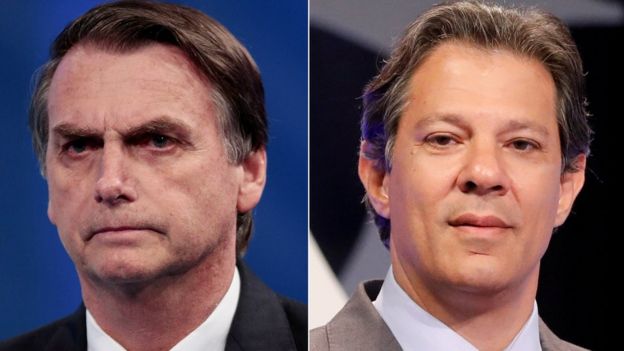 REUTERS
REUTERS
The group that sets the record is the "Political Debate": 1,793 messages sent during the night and dawn. The group has 166 participants with DDDs ranging from 11 to 99. There are people from São Paulo, Minas, Rio, Paraná, Espírito Santo, Rio Grande do Sul, Brasilia, Bahia, Pará, Maranhão, Alagoas, Ceará and Pernambuco. There are even some users in the United States.
But the dynamics of the group is the opposite of what his name propagates ("of debate only has the title!", Told me one of the members of the group, the student potiguar Renan Bezerra dos Santos, 17). There is no debate, other than users bombarding the group with a number of texts, links, images and videos, without rest, without exchange of ideas.
At least it is a democratic group, although focused on the two extremes of the dispute: Bolsonaro's supporters publish content in their favor at the same time as they receive material from Lula and Haddad.
- 'I doubt that Bolsonaro will implant dictatorship and that the PT will transform Brazil into a Venezuela', says Brazilianist
- The minutes leading up to the capoeira master murder after political discussion in Bahia
To facilitate my experiment, I use the "WhatsApp Monitor", a system created by Professor Fabrício Benevenuto of the Department of Computer Science of the Federal University of Minas Gerais (UFMG), and maintained by him and his students.
The system tracks 272 public WhatsApp groups by means of mobile phones posted just for this and shows the pictures, links, videos and texts shared in the groups. The researcher decided to share the system with the press, which started to have a channel to monitor what until then was an unknown universe of disinformation in the network. There is no personal data collection of participants.
Some of the groups monitored: "Jair Bolsonaro 2018", "Lula Presidente", "Brazil with Ciro". It even has a "Cape Daciolo President". Most groups bring together single-sided supporters, forming a bubble network that barely communicates at the group level, but permeates different sectors as content spreads through the millions of known groups and relatives.
There are more groups about Bolsonaro (there are 33) than the rest. This creates, in the researcher, a concern with the imbalance of the study. However, it may indicate that, in fact, there are more political groups about the candidate in WhatsApp. It is impossible to know for sure, since the application does not disclose the total of existing groups.
Datafolha data, however, throw light on this doubt: responding to the survey this week, Bolsonaro voters were the ones who most stated using a social network - 81% - to 59% of Haddad's voters. They were also the ones who most said they read politics news on WhatsApp. They are 57% of Bolsonaro voters, while only 38% of Haddad voters say they report in the policy application.
 GETTY IMAGES
GETTY IMAGES
Therefore, the result of my experiment shows more false news published by a pole, the side of Bolsonaro. But we know that there are false news produced by the left that circulated too, such as when Bolsonaro was stabbed.
On the occasion a month ago, they were broadcast in groups, for example audios and pictures saying that the attack had been armed - because there was no blood, because the doctors who attended him were without gloves or because the presidential had been registered smiling and entering the hospital, even though this last scene happened on the same day, but before the attack. As we well know, Bolsonaro was a stabbing victim.
To reach the groups it monitors, Benevenuto automated a search for WhatsApp group links with keywords linked to the policy. That is, entry into political groups is as impartial and comprehensive as possible.

My seven-day journey began in
MONDAY, 24 SEPTEMBER
FALSE LINK TO DATAFOLHA
The most publicized link of the day, shared 45 times in 29 groups, is an alleged Datafolha poll: "Your input is very important to us! Get involved in the survey and check the results of the election today."

That, for me, as a journalist, is easy. I guess it's a fake link because I know there are no Datafolha surveys conducted online. A simple search confirms my hypothesis: I type "Datafolha WhatsApp" in the search engine and the first result is a report informing that the Datafolha links shared in groups are false.
The original link with the fake news is already off the air - and it is impossible, therefore, to find out to whom it belonged and for what purpose it was created.
IMAGES AGAINST LGBT AND WOMEN'S RIGHTS
I also see that users have shared images in large quantities against LGBT rights and women.
In the system we have: photos of Haddad with drag queens (9 groups), the photo of a couple of men and one of them kissing a boy, implying that it is pedophilia (7 groups - and the photo is actually a American gay couple with her son), an image of a feminist protest criticizing women's nudity (6 groups) and the photo of two men giving a kiss - one being dressed as Jesus (5 groups).
A very shared montage shows Lula's face and, next to it, the number 17 - that is Bolsonaro, not the PT, number 13.
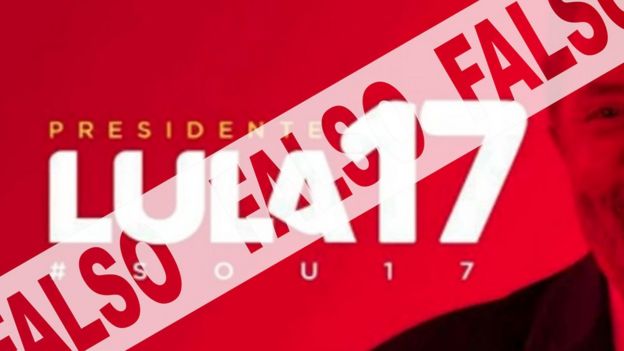
TUESDAY, SEPTEMBER 25
'VIRTUAL LINKAGE'
The next morning, the most shared content of the day is a link, sent by 62 people in 46 groups. It is the video of the singer Daniela Mercury calling "women against Bolsonaro". The video, as I write this, has 3.2 million views, 24,000 tanned and 1.2 million discounted.
The most shared message of the day explains the huge amount of discounted, a "deslike" campaign organized: "Towards 2 million!" "Let's give dislike in the videos of the artists rounet's EleNão. Click on the link, the video will appear and you click on the hand 👎 The difference from 👎 to 👍 is gigantic."
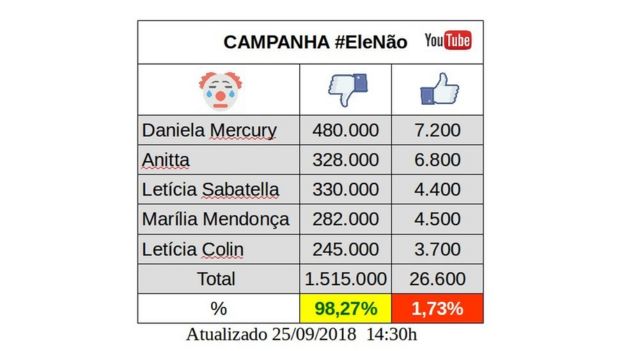
In the next few days, the campaign will continue, asking for registration in the PSL channel, Bolsonaro party - "at that moment we lost to the PT in the number of subscribers." It also asks users to download videos from business starring artists such as Anitta to make them "lose sponsorship."
A systematized table will circulate to count the number of tanned and uncured ones of each artist. "We're going to make her lose her sponsorship, only then will these artists really feel our strength!"
WEDNESDAY, 26 SEPTEMBER
PRESS RELEASE
Attacks on press vehicles are frequent. They range from messages that try to leverage fake content with phrases such as "That's not the press," "The media hides" to the grotesque falsification of news.
On the third day, following the groups, I see that three covers of traditional magazines in Brazil - Veja, Época e Exame - are, together, shared in 17 groups. The "cover story" of the three shows the Mexican Gerardo de Icaza, director of the OAS Department of Electoral Cooperation and Observation, assuming "fraud at the polls in favor of the PT."
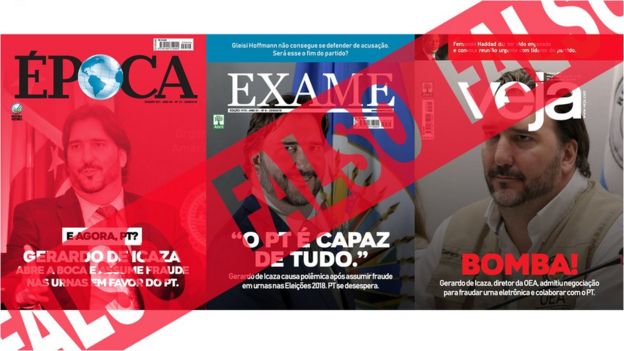
Fake newsmakers appropriate real news formats to support the lie and confuse those who rely on traditional media. Being a journalist, I can identify this quickly. This is another fake news easily overtaken in a quick search. It is not the cover of any of the three magazines.
On this day there is another attack on the press: six other groups received a message from a person who claimed to work at Globo publishing house, saying that the company's summit had gathered to guide actresses to publicly stand against Bolsonaro in the networks. "Globo had a billion dollar contract with the PT and for decades it has been funding Lula's campaign," the text said. The message has the typical warning signs of deceptive content: it claims something bombastic without citing source.
THURSDAY, 27 SEPTEMBER
FUTUROLOGIA ENGANOSA
I decide to give this name to another type of false message that I have observed circulate in groups. Messages and audios warn of what "will happen in the next few days", especially in the press. In an exercise in misleading futurology, the makers of fake news seem to create some of them preemptively.
This type of false news also gives the message a premonitory air of "inside", although "predictions" are things that anyone could predict. Others, on the other hand, are clearly an invention of things that will never happen - but the message is conveyed and, even if they do not, the damage may already have been done.

Some examples:
- The message from the person working at Globo magazine says: "There are still going to be a lot of other actors, presenters and ex-BBBs, but it will be little by little, 2 or 3 a day, not to be too 'in the face'."
- A widely circulated text about an interview allegedly authorized by Justice with Adélio Bispo, the man who stabbed Bolsonaro, says that in the coming days he would say that the bombing was a frame. He also said that "these lying statements will air 2 days before the election" and "the communist media will bomb the 'myth' on TV." The text asks the user to share it to the maximum to "save Brazil". The call for maximum sharing to "save the country" is a frequently used technique. The message circulated in at least 45 groups on Monday, in the form of text and image, and on Thursday, still had breath.
FRIDAY, SEPTEMBER 28
BOLSONARO 'NAZISTA'
The news that reserve general Hamilton Mourão, Bolsonaro's vice presidential candidate, had criticized the 13th salary, had been disclosed the day before. It was likely, then, that the subject was the subject of the content spread by the opposition.
In a few groups, images began to circulate on the subject, always associating Bolsonaro with Nazism. Example: a cartoon in which Mourão says "let's end the 13th salary of the worker!" and a Bolsonaro - with Hitler's mustache - replies "This was a secret! Can not you keep your mouth shut?"
In another group, an image says "Bozonazi's proposal to end 13th and additional holiday is for after election. A third: "Bozo's military government has not even begun and we have one missing, Paulo Guedes ...", referring to the economist who participates in the PSL campaign.
That is, part of the messages joke mixture, decontextualization with defamatory content as the connection of Bolsonaro to Hitler. In the case of the 13th, Bolsonaro had disowned his deputy saying that it was an article protected by a stony clause of the Constitution and therefore could not be revoked. Some experts say the stony clause protecting "individual rights and guarantees" would prevent an amendment that would bring down the 13th.

SATURDAY, 29 SEPTEMBER
AUDIO OF 'PEOPLE AS THE PEOPLE'
On the penultimate day, following the groups, the technique of "intimate" audio, that is, of someone "people like us" who shows sympathy for a candidate - something I heard all week long is clear.
I observed some patterns that were only clear when I looked at the messages together:
- The narrators are, for the most part, men
- Men who tell banal real-life stories - some situation that would have happened to them and that involves some candidate
- They use very informal ways of addressing the listener, as if they knew him, as if that message were initially addressed to a friend and "fell into the net"
- And that they live situations impossible or almost impossible to check
My guess is that this kind of audio provokes familiarity, closeness, and sympathy - even to me, as I analyze that content and listen to the recordings.

Of the audios that circulated most during the week, we have:
- The carioca taxi driver - who we do not know whether he is a taxi driver or not - working during the protests (in the protest against Bolsonaro, there was "a smell of marijuana" and "general drinking"; likes to suck "). "I saw this, it was not anyone who told me, no, I'm here on the track working," he says. His audio begins with him saying: "C ... Valverde, today I'm working only on demonstrations."
- The biker from Minas Gerais - who we do not know if he is a biker or not - tells us that he entered a Boticario store in Lagoa Santa (MG) and frightened the attendant because he was wearing a helmet. "But when she saw that I was wearing the shirt of Bolsonaro, she already calmed down at the same time. 'Bandit does not walk in Bolsonaro's shirt, no.'" "Look at you, cara, how interesting, the image that the guy which has already passed through society (...) Look at the differential, see. What a good thing. " This one starts the audio saying: "Speak, Ze Teo, beauty? Here, look interesting, dude." (Detail: I called the Boticario store in Lagoa Santa. Already aware of the audio, a store employee said that the situation narrated never happened.)
- The tourist in Rio de Janeiro - at this point I do not have to say that we do not know if he is a Carioca tourist in Cuba or not - he says that everything he said "there with the people is exactly what we are now living in the country", in a alarmist tone. That tourist starts telling his story like this: "Fuck, Jorge, I went there on that shit to see what this scheme is like to open up for tourism."
- The tourist from Rio de Janeiro - "Ô, Léo", begins the audio, "I went to Chile to ski and I met three Americans who are over 60 years old." The narrator says that the women say that American President Donald Trump "is a jerk, looks like a child," but that he is a "good ruler" and people who do not like him are "smoking marijuana, artists, ". The narrator then says that the same thing goes for the Bolsonaro. "I hate Bolsonaro and I'm going to vote for him!" He says humorously. The first time I heard the audio, through the system, was on Monday, shared in 20 groups. The audio took almost a week to breathe.
It is impossible to check the source of an audio in WhatsApp.
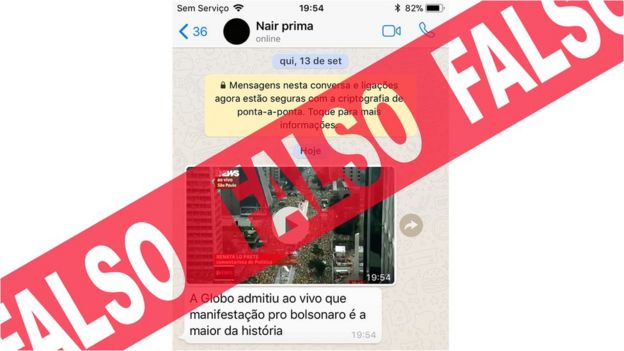
SUNDAY, SEPTEMBER 30
WAR OF MANIFESTATIONS VERSIONS
The weekend was marked by a dispute over the demonstrations against Bolsonaro on Saturday and in favor of it on Sunday, circulating on Facebook and Twitter. One would expect the narratives to stop at WhatsApp.
A video shared by 22 users in 19 groups shows the Paulista avenue in São Paulo, covered with demonstrators using green and yellow. The message accompanying the video says: "Globo has admitted live that Pro Bolsonaro is the biggest demonstration in history." In the video, the GloboNews journalist says that the Military Police "just updated that the number of protesters in Paulista reached one million," while the images were shown.
It even seemed believable. But a quick search for the keywords would be enough to disassemble the version. "I protest 1 million Globonews", I type in Google. It was a March 2015 video and the protest was against Dilma Rousseff.
In one of the groups I am part of, a user shares the cover of the newspaper O Globo, whose main picture was of the protest against Bolsonaro in Cinelandia. The message that accompanies: "Today's Globe Photo showing the full moon ... to the bottom of the building that collapsed (sic) six years ago, intact!" Glad they are stupid. A second user sends several emoji by tapping the palm. There is no reaction from the other members of the group, there is no conversation. More people glue other links over. You can not tell how much it has been read or absorbed or passed on by other people.
The photo on the cover of O Globo newspaper was true.
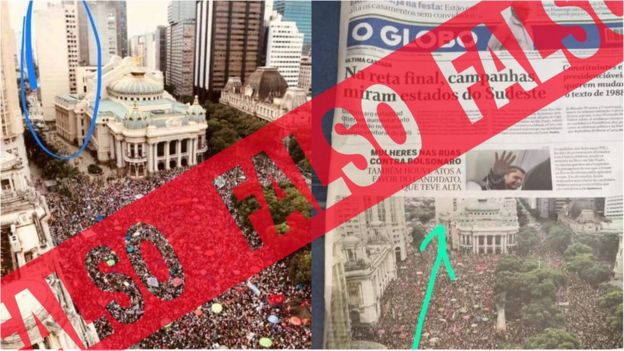
"It was an eagerness that I sent," said the technician from São Paulo, Cleber Machado Leão, 41, the user who sent the news to the group. "I got the news, it won me over and convinced me because, in fact, it was what seemed to be happening, I thought they were trying to inflame the protest, so I decided to take that risk."
Asked why he did not correct the error by discovering that he had shared false information, he said, "I lost the reference of which group I had sent." Leo, voter of Bolsonaro, participates in "some 40 groups" to "feel the political thermometer" of the population.
"You can not get much information in the groups because there is a lot of false news and there is a lot of noise," he says. "But in the groups, I can see a thousand people talking and so I end up knowing more opinions that I would not know during the day, when I can not see so many people."

Almost all false information I encountered during the seven days had already been checked by the Brazilian press. Just search for keywords in the search engine.
For Professor Fabrício Benevenuto, public groups can be "a gateway to misinformation within WhatsApp."
Through the project that monitors them, he says, it opens a "little gap" to see what is happening in this ecosystem. With people well engaged within public groups and with the ease of passing on messages, the hypothesis is that they pass information from public to private groups. "And thereafter it spreads throughout the entire WhatsApp network," says the researcher.
 REUTERS
REUTERS
In private groups, he adds, the information is passed on by someone who is a friend, neighbor, relative. "You trust the person who passed it on to you and come to believe that information, not the one that was broadcast by the mainstream media," says Benevenuto, who advocates a WhatsApp action that creates technology solutions that prevent the spread of false information in the application.
Its system is being used by journalists at Comprova, a news verification project with 24 Brazilian media outlets led by Abraji and Harvard-based First Draft News research laboratory.
In the evaluation of Yasodora Córdova, a researcher at Digital Kennedy School and Harvard's First Draft News, who works with Comprova in Brazil, the disinformation circulating in WhatsApp is generally the same as that circulated in other social networks. The problem is not the network, she says, is what was "swept under the rug" in Brazilian society that, according to her, is in the Stone Age in terms of public debate.
And what does the country need to combat disinformation? Education, reliable and local sources of information, less skewed media concessions. "WhatsApp only added scaling to those problems."
Asked, WhatsApp said through its press office that these public groups "make up a very small percentage of WhatsApp use" and that 90% of the messages sent are between two people. "Most groups have ten or fewer people."
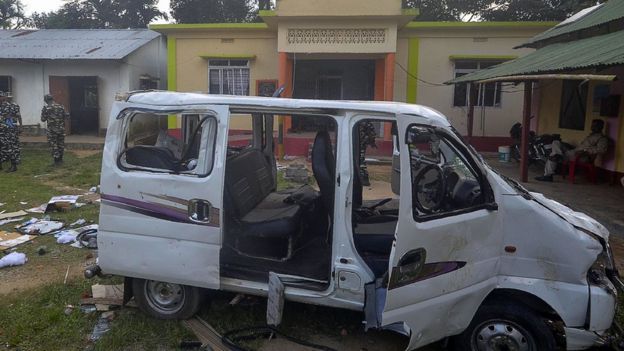 GETTY IMAGES
GETTY IMAGES
He also said that the company is working with facts checking entities in Brazil, as Prove. In addition, the application has created a bookmark that shows that the message it received was forwarded by someone else and not originally written by it and made "a large-scale education campaign in Brazil and in other countries about misinformation."
According to the company, she also began testing a message forwarding limit on WhatsApp - in India, after misinformation shared in the application led to innocent lynching, a referral limit was imposed for 5 people per user. In Brazil and in the world, the limit is 20 people.
google images source
source wording https://www.bbc.com/english/
bbv
RELATED TOPICS
11










Comentários
Postar um comentário